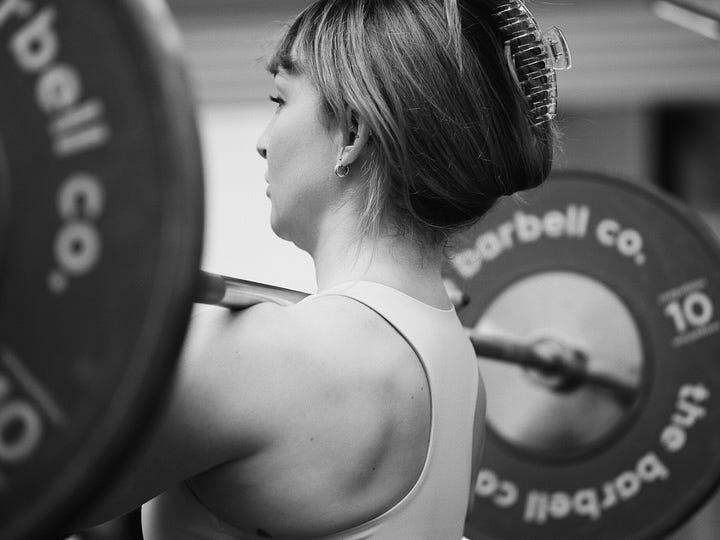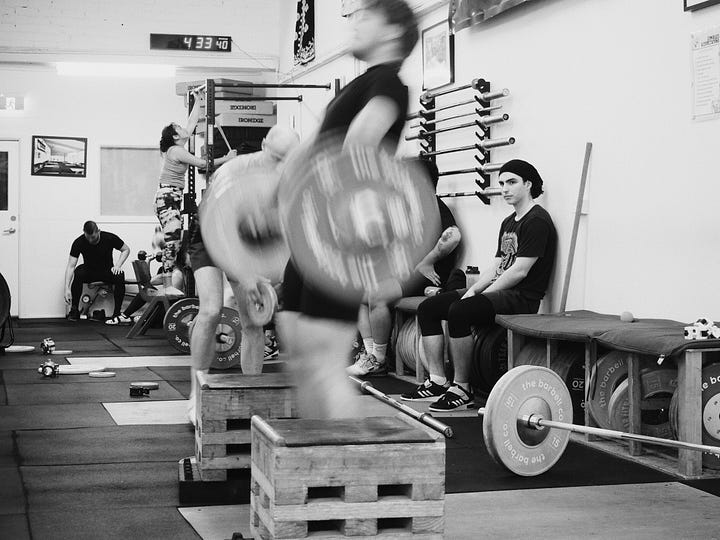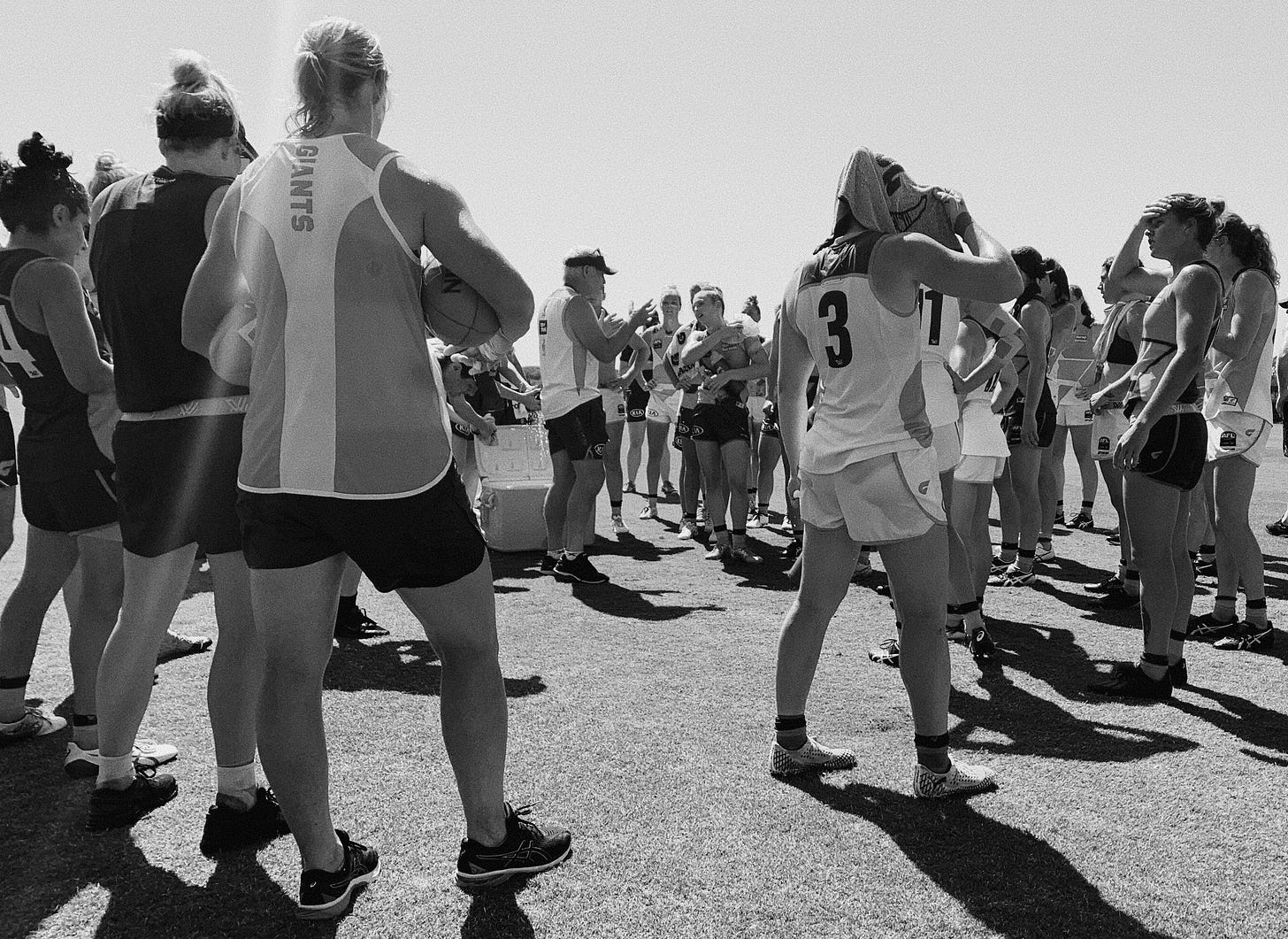Nowhere to hide
Weightlifting - like many sports - exposes us for who we are. I can deal with knees that hate me, but I am struggling with other truths I'm being shown.
When I was at the Giants, I watched the women run until I thought they couldn’t possibly keep going. I watched them religiously stretch and prepare their bodies for play in deliberate movements that required control and discipline.
They were measured constantly. Every player weighed before and after matches. Their speed and distance covered recorded through a GPS chip worn in a little pocket high on the back of their guernsey. Their watches tracked activity when they were at home. A dietician distributed supplements tailored to players’ individual requirements.
There were probably other measures of which I was not aware or did not see. I did not see physio sessions, the hours spent taping limbs before training and games. A shoulder for one player, two for another. A knee for an older player. Wrists and fingers.
Despite their part-time status, they took this body work seriously. I had watched the team develop since the competition began in 2017. Their bodies had become stronger and leaner. I was acutely aware of my own body moving amongst them, not only the players, but also the staff. Everyone was fit. Everyone could crack out a few laps of the oval if they so desired. The women tried to hide pain, particularly the older ones who had spent years playing for the love it: no crowds, no money. If you didn’t keep playing, what did you have?
I envied them. I didn’t necessarily want to run like they did, but I wanted to be confident in my abilities, in my body. I wanted to have a functional body like they did. A. body capable of doing things at will and unconsciously, rather than having to think twice about whether it could lead to injury, or worse, embarrassment. I hungered for the games, the play, the abandon, the exhilaration that came from chasing a ball around a field.
I thought: if I could get myself some discipline and a program or sport I enjoyed, it would all come together. I just needed to do it.
What I didn’t realise was that to get to where I wanted to be, I’d have to confront myself.
I’d have to look squarely at truth.
Alex says: “People always think of the outcome. They don’t see the process. If you don’t think and act like an athlete, then you will not become one. You don’t train and then suddenly one day you are an athlete. You must think like one - to be one - from the beginning; that is how you become an athlete. It is a process and throughout the whole thing, you are an athlete. Otherwise, you never will be.”
People think the hardest thing is the physical work. But it’s not. There are two other things that make it hard: discipline and honesty.
I’m not going to say much about discipline today because that needs its own newsletter (or book) to pull apart. The one thing I will say is that I used to understand it as a willingness or drive to keep oneself under control. To not give in to temptation (thanks Catholic school). I have, however, heard it described as self-respect; as an expression of kindness to yourself.
Last week Dash said to me: “I told myself I would train in the morning, so I did. I needed to keep my word”. (He has taken up running this year and seems to have found his thing. He has already trained himself for a half marathon and completed it in a time that I can’t fathom. Tonight, he ran 23km after working all day as a mechanic).
Dash kept his word: to himself.
For reasons that are not completely clear just yet, I’ve realised I don’t always feel that I should be kind to myself. I don’t feel I owe myself my word.
Danica says: “In weightlifting, you need to confront things”


My training has been haphazard for a while. I’m not eating properly and I’m indulging. I’ve had injuries. I’ve had a tooth issue (and now know about bone spicules and I really didn’t need that dear god). I’ve been away.
So when I turned up to train on Saturday and I started going through the program and my body moved slowly, with rickety movements, I was not surprised. What did surprise me was the clarity with which I finally understood the words of Alex and Danica. As I sat on the bench between sets, I finally understood them in my bones, not just in my head.
I couldn’t deny that I had not done the work. The lifts weren’t working because I had stepped out of the process for a few weeks. The truth of what I had been doing hit me in the face. I could make all the excuses – and I’ve just listed them above – but those things ceased to be excuses. They were actions I took by choice.
This was not a shock. The thing that hit me in the chest was why I had done those things. Why I had chosen to do those things and not do the thing that I desperately want to do: get better at weightlifting.
That truth is uncomfortable. I can’t even fully describe it yet. When I train, when I try to commit to something that requires a discipline steeped in self-respect, it is exposed. I feel exposed. The cycle repeats. I retreat back into my excuses. I withdraw from people and from the world. I stick my headphones in and walk the dog and pretend that this level of physical movement is enough, even when I realise I’m practicing my pull – getting my elbows high – as I wander around Sydney Park.
Is there, however, a “truth” about my knees?
A month or so ago I said to Alex: “I am so afraid that I won’t be able to do this anymore (because of my knees)”.
She said: “Well, that’s your decision”.
I said: “I am worried my body will take the decision out of my hands”.
She said: “Are you dead? That’s the only time it’s not in your control”.
I’m willing to take Alex’s point of view and ignore any other truth about my knees - aside from the one that says I can continue - until I am forced by something extreme to think otherwise. That particular truth doesn’t bother me as much as it possible should. I know, however, that I can’t ignore the other, more uncomfortable truth if I want to lift properly.
Other stuff
This week I listened to Alyce Parker of the Giants speak with great maturity on this podcast and that only made my own murky and immature approach to weightlifting more obvious. Thanks Parks! Seriously, worth a listen.
(Full disclosure: I sponsor Alyce and her match-worn shirt hangs behind my desk).I started this local Australian Football season coaching the U15s again, as regular readers will know. However, I realised I had taken on too much and I handed the reins to Dash. After more than two years of losses, the team won on the weekend. I was there, working the bbq because I can’t stand on the sidelines without getting anxious. After the game I walked onto the field, even though I was not supposed to be there. One of the players hugged me and then several others surrounded me until I couldn’t see. Yeah, I cried. Those kids deserved it and I was so glad Dash was able to help them finally sing the song. Why is sport so bloody emotional? Sometimes I think life would be easier without it.
Thank you, as always, for reading.
Georg x
Here’s the link to ‘buy me a coffee’ (make a small, one-off contribution) if you think sometimes I should be paid to write and you’d like to contribute to my knee physio fund.


